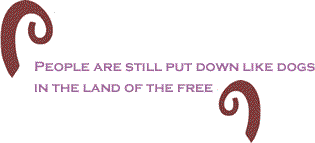There�s a buzz about
the death penalty in America
these days. And nearly all of the conversation focuses
not on how to maintain the practice, but rather on abolition.
Connecticut
just decided to repeal the death penalty, following the
lead of Illinois, New Mexico and New Jersey
in recent years. Meanwhile, California voters will vote on a ballot measure that would eliminate
one-quarter of the nation�s death row.
Faced
with the high cost, lack of deterrent effect and the inevitability
of executing innocent people, some states are taking another
look. Moreover, given the appalling specter of prosecutors
striking black jurors and other forms of racial misconduct,
North Carolina and Kentucky have enacted racial justice legislation
to overturn racially biased death sentences.
With
the European Union enacting an export ban on lethal injection chemicals to the U.S., states are
scrambling to find out how to kill people. With diminished
supplies, states are faced with the option of suspending
executions altogether, or like a violence addict, purchasing
the poisons on the black market. In other cases such as
Ohio, they have abandoned the commonly-used, three-drug protocol
in favor of a single drug such as pentobarbital - a more
commonly found substance used to euthanize animals.
And
so, as people are still put down like dogs in the land
of the free - despite the momentum for abolition - capital
punishment represents America�s human rights blind spot. But really,
this is about more than executions. Rather, it speaks
to a nation that often pays lip service to upholding human
rights, but debases and denigrates human life through
its actions. The result is a callous culture of violence,
neglect and disregard.
The U.S. ranked fifth in the world in capital punishment last
year, in league with China, Saudi Arabia, Iran and Iraq.
A world leader in executions, America
is the world�s foremost leader in prisons. The U.S. claims one-twentieth of the global population,
but one-quarter of the world�s prisoners. A majority of
these prisoners are poor and of color, poorly educated,
poorly represented in the courtroom and failed by the
system. The warehousing of people is big business, an
unseemly union of criminal justice policy and profit motive.

Is
it an accident that the world�s prison leader also ranks
near the bottom in income inequality, boasts the largest income
inequality in the developed world? Hardly not. Inequality
in the land of opportunity is far more than in Europe,
Canada, Australia
and South Korea,
but also more than nearly all of Asia, West Africa and North Africa.
The top 1 percent of Americans enjoy far more than elsewhere
in the West in terms of executive pay and policies favoring
the rich. This, as America�s
99 percent receive far less government support for health insurance, daycare,
pensions and education.
Meanwhile,
as the U.S. preaches democracy
to the rest of the world, it enacts voter ID laws that
could potentially disenfranchise millions of citizens.
Harder to vote, yet easier to purchase a gun. Leading
the industrialized nations in handgun proliferation and firearms deaths, America is truly
what Martin Luther King called �the greatest purveyor of violence
in the world today.� Lax gun laws, �shoot to kill�
legislation and laws allowing concealed weapons in schools, churches, sports arenas
and bars reflect the power of corporate arms manufacturers
in U.S. politics. Made in America,
the violence is exported to Mexico
in the form of illegal weapons fueling the drug war carnage.
And
this culture of violence extends to the death penalty,
in a country conditioned by years of dehumanization, normalized
through slavery and Jim Crow lynching. The
death penalty is the tip of the iceberg when it comes
to human rights violations in the U.S.
It might be the most disturbing example of the human rights
challenges facing the nation, and the challenges are many.

BlackCommentator.com Executive Editor, David
A. Love, JD is a journalist and human rights advocate
based in Philadelphia, is a graduate of Harvard College and the University of Pennsylvania
Law School. and a contributor to The Huffington
Post, the Grio, The Progressive
Media Project, McClatchy-Tribune News Service,
In These
Times and Philadelphia
Independent Media Center. He also blogs at davidalove.com, NewsOne, Daily Kos, and Open Salon. Click here to contact Mr. Love.

